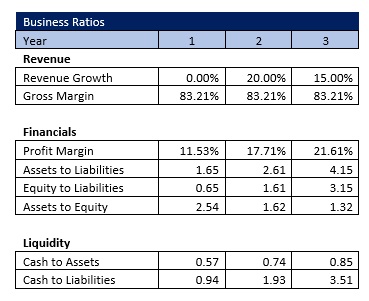Please note that the financials in this complete free business plan are completely fictitious and may not match the text of the business plan below. This free business plan demonstration purposes only. If you are interested in purchasing the completed editable MS Word and Excel documents for this business plan, please click the button below! Also, the text of the business plan is formatted with a fully automated table of contents.
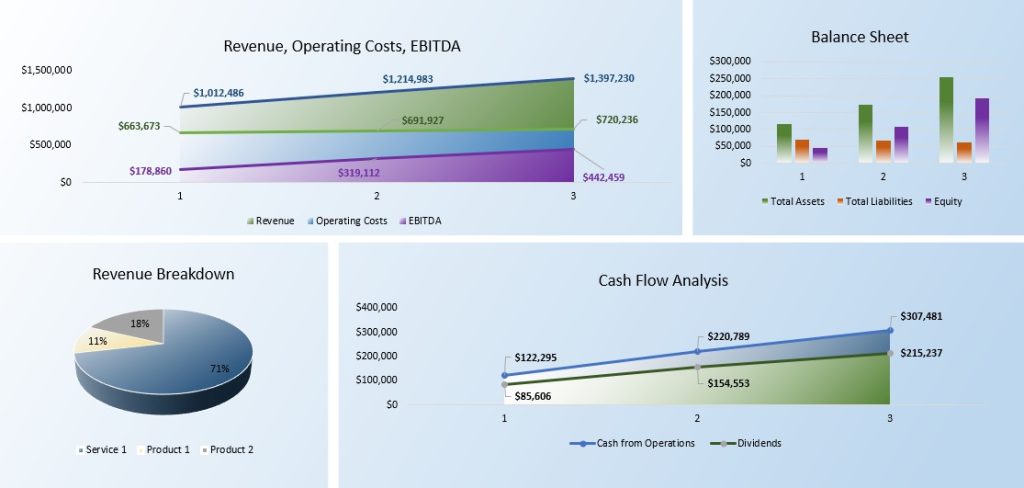
1.0 Executive Summary
The purpose of this free business plan is to raise $100,000 for the development of an apparel design firm while showcasing the expected financials and operations over the next three years. The Apparel Designer, Inc. (“the Company”) is a New York based corporation that will provide fashionable apparel products to customers in its targeted market. The Company was founded in 2009 by John Doe.
1.1 Products and Services
The Apparel Design Company will be actively engaged in the business of designing, marketing, and outsourcing the manufacturing of the Company’s proprietarily designed clothing. The Founder, John Doe, is a highly talented graphic artist and clothier that has dreamed of developing his own studio for more than a decade. At this time, the Company has begun to source manufacturers and wholesalers that the business will use at the onset of operations. The Company has also planned an expansive marketing campaign that will create a brand identity for the Apparel Designer. The third section of the free business plan will further describe the services offered by the Apparel Designer.
1.2 The Financing
Mr. Doe is seeking to raise $100,000 from as a bank loan. The interest rate and loan agreement are to be further discussed during negotiation. This free business plan assumes that the business will receive a 10 year loan with a 9% fixed interest rate.
1.3 Mission Statement
The Apparel Designer’s mission is to provide outstanding clothing designs that are fashionable for men and women.
1.4 Management Team
The Company was founded by John Doe. Mr. Doe has more than 10 years of experience in the apparel and apparel designer industry. Through his expertise, he will be able to bring the operations of the business to profitability within its first year of operations.
1.5 Sales Forecasts
Mr. Doe expects a strong rate of growth at the start of operations. Below are the expected financials over the next three years.
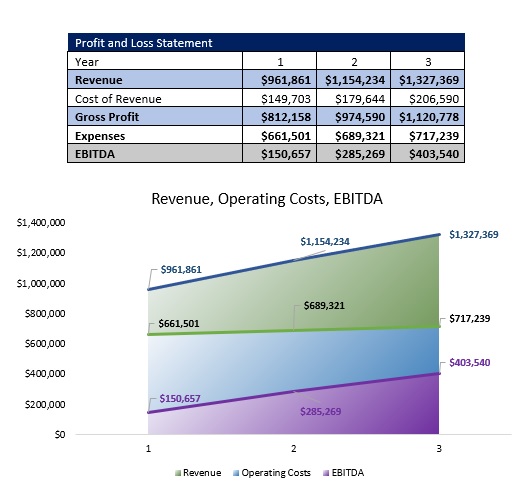
1.6 Expansion Plan
The Founder expects that the business will aggressively expand during the first three years of operation. Mr. Doe intends to implement marketing campaigns that will effectively target individuals within the target market.
2.0 Company and Financing Summary
2.1 Registered Name and Corporate Structure
Apparel Designer, Inc. The Company is registered as a corporation in the State of New York.
2.2 Required Funds
At this time, the Apparel Designer requires $100,000 of debt funds. Below is a breakdown of how these funds will be used:
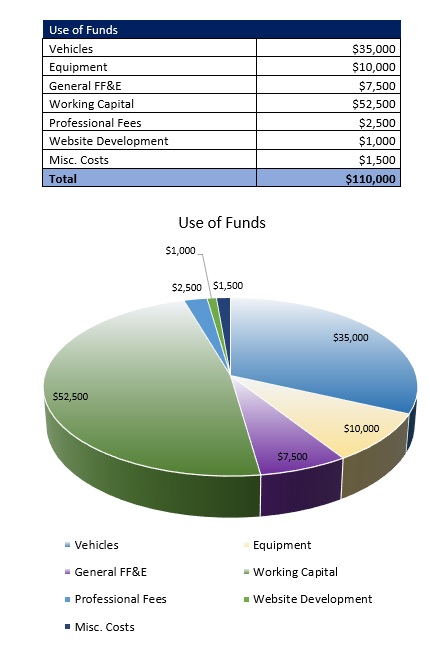
2.3 Investor Equity
Mr. Doe is not seeking an investment from a third party at this time.
2.4 Management Equity
John Doe owns 100% of the Apparel Designer, Inc.
2.5 Exit Strategy
If the business is very successful, Mr. Doe may seek to sell the business to a third party for a significant earnings multiple. Most likely, the Company will hire a qualified business broker to sell the business on behalf of the Apparel Designer. Based on historical numbers, the business could fetch a sales premium of up to 4 times earnings.
3.0 Products and Services
Below is a description of the apparel design services and sales of apparel offered by the Apparel Designer.
3.1 Sales of Designed Apparel
The Company will actively sell and trade men’s, and women’s apparel to its retail clients. The Company’s manufacturers will produce the Apparel Designers’ proprietary clothing. All of the business’ sold apparel will always be of the highest retail quality. Management anticipates that the Company will be able to mark-up our purchased inventory 60%-75% of its actual cost. This is an unusually high margin for a branded label merchandise business. The key to the success of the business will depend on Management’s ability to create a stable brand that attracts a young customer group
3.2 Licensing of Trademarks and Logos
As the Company develops its brand name, Management fully intends to license and develop strategic relationships with retailers and manufacturers that want to participate in the Apparel Designer’s success. If the Company’s marketing campaign is successful, the Company will be able to offer license of its trademarked logos and branding to other businesses and as such the fees and licensing percentages will greatly increase the Company’s profitability.
4.0 Strategic and Market Analysis
4.1 Economic Outlook
This section of the analysis will detail the economic climate, the apparel industry, the customer profile, and the competition that the business will face as it progresses through its business operations. Currently, the economic market condition in the United States is in recession. This slowdown in the economy has also greatly impacted real estate sales, which has halted to historical lows. Many economists expect that this recession will continue until mid-2009, at which point the economy will begin a prolonged recovery period. As such, the business may have a decline in revenues as end users have less discretionary income.
4.2 Industry Analysis
Wholesale and retail apparel trading industry is one of America’s largest industries. The industry which includes merchandise apparel is a $150 billion dollar per year industry. There are over 162,841 businesses in the country that are actively engaged in the trade and wholesale of non-durable goods such as apparel. In the retail apparel industry there are over 94,720 individual establishments that deal in apparel that is sold directly to the end user. This industry is highly fragmented, but it has a number of large corporations that operate several thousand retail locations throughout the country. The retail industry has recently undergone a period of aggressive mergers and acquisitions. Larger corporations are in the market for businesses that have established themselves as profitable and have developed a brand name retail clothing line/locations. It is very possible that Management may engage one of the larger corporations for the sale of the Company as per Management’s ideas as a possible exit strategy.
4.3 Customer Profile
The Apparel Designer’s average end user will be a middle to upper middle class man or woman. In this section of the analysis, you should describe the type of customer you are seeking to acquire. These traits include income size, type of business/occupation; how far away from your business is to your customer, and what the customer is looking for. In this section, you can also put demographic information about your target market including population size, income demographics, level of education, etc.
4.4 Competitive Analysis
This is one of the sections of the free business plan that you must write completely on your own. The key to writing a strong competitive analysis is that you do your research on the local competition. Find out who your competitors are by searching online directories and searching in your local Yellow Pages. If there are a number of competitors in the same industry (meaning that it is not feasible to describe each one) then showcase the number of businesses that compete with you, and why your business will provide customers with service/products that are of better quality or less expensive than your competition.
5.0 Marketing Plan
The Apparel Designer intends to maintain an extensive marketing campaign that will ensure maximum visibility for the business and its proprietary apparel in its targeted market. Below is an overview of the marketing strategies and objectives of the Apparel Designer.
5.1 Marketing Objectives
- • Develop an online presence by developing a website and placing the Company’s name and contact information with online directories.
- • Implement a local campaign with the Company’s targeted market via the use of a broad based public relations campaign.
- • Establish relationships with apparel distributors and wholesalers within the Company’s initial rollout markets.
5.2 Marketing Strategies
Retail marketing will be the most difficult portion of the marketing strategy. This is because one of the essential elements to reaching a retail audience is that the Company must build a brand affinity with the customer. Management fully expects to enlist the help of a marketing firm to reach the Company’s targeted consumer. Specialized apparel for women/men is an extremely competitive market, and as such, the Management of the Apparel Designer will need to develop a marketing program that creates a branded image edge over its competition. Additionally, conventions, apparel trade shows, online advertising activities, sales development and viral marketing campaigns will follow carefully orchestrated strategies by Apparel Designer’s marketing consultants. Timely coverage of the Apparel Designer and the Company’s collection will be further directed through ongoing press relations, news releases and feature stories targeted at key professional apparel communities and other media outlets.
5.3 Pricing
In this section, describe the pricing of your services and products. You should provide as much information as possible about your pricing as possible in this section. However, if you have hundreds of items, condense your product list categorically. This section of the free business plan should not span more than 1 page.
6.0 Organizational Plan and Personnel Summary
6.1 Corporate Organization

6.2 Organizational Budget

7.0 Financial Plan
7.1 Underlying Assumptions
- • The Apparel Designer will have an annual revenue growth rate of 16% per year.
- • The Owner will acquire $100,000 of debt funds to develop the business.
- • The loan will have a 10 year term with a 9% interest rate.
7.2 Sensitivity Analysis
In the event of an economic downturn, the business may have a decline in its revenues. Designer apparel and its related products are luxury items, and in the event of a recession, consumers may decrease their demand for couture and designer apparel. However, the Company generates very high margins from its apparel sales, and the Apparel Designer will be able to remain profitable despite deleterious changes in the economy.
7.3 Source of Funds

7.4 Profit and Loss Statement
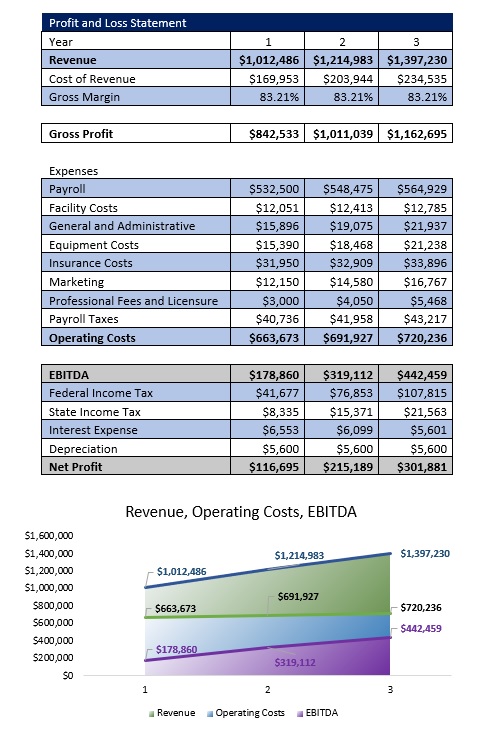
7.5 Cash Flow Analysis
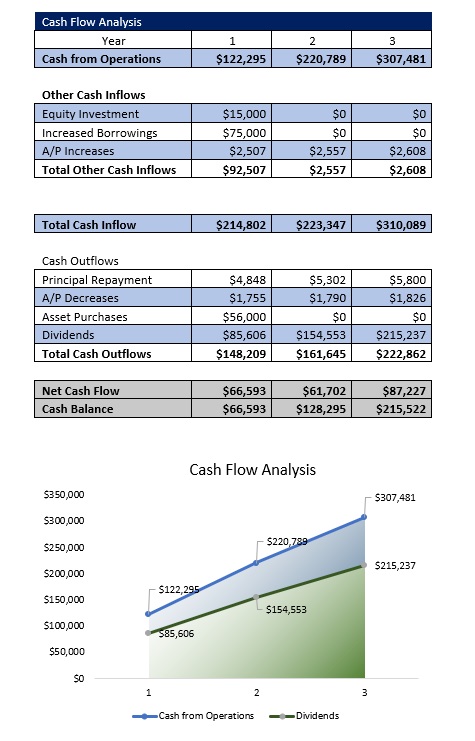
7.6 Balance Sheet

7.7 Breakeven Analysis
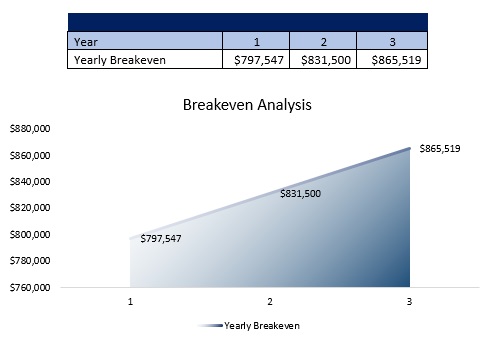
7.8 Business Ratios
